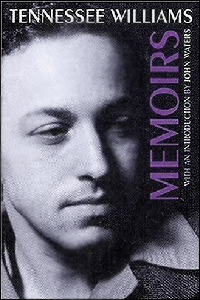 Memoirs
Memoirs
by Tennessee Williams
New Directions
368 pages, $15.95
ISBN: 0811216691
Reviewed by Steve Lavigne
When the late American playwright Tennessee Williams published his Memoirs in 1975, the Stonewall Revolution was less than a decade old, and reviews were merciless, because William’s wrote so openly about his sex life. Having recently come out, I read the Memoirs as research for a now long-forgotten book project, and found them no different from much of the Gay literature I was reading at the time. Williams passed on less than a decade after their publication and the book was left to gather dust on library shelves or in remnant bins.
Now reissued by New Directions, and with an introduction by film director John Waters, Tennessee Williams’ Memoirs are a pleasure to discover again. Yes, there are the commentaries on his sexual encounters, including his relationship with the loves of his life, Frank Merlo and his sister, Rose (model for the character Laura in The Glass Menagerie). The one thing that reviews ignored at first, but which must be savored here, is that William’s’ writing style was always lyrical and he brings that same poetic style to his life story. Williams recognized his demons and faced them while composing this book, but if the stream of consciousness is, at times, disjointed, that’s forgivable.
The strongest theme that emerges from Memoirs is his feelings toward those whom he most admired, especially the writer Carson McCullers. No one wrote so refreshingly about the exploits of Anna Magnani, who would win the Oscar for her performance in Williams’ The Rose Tattoo. He writes beautifully of affection for and appreciation of the gifted Maureen Stapleton, Marlon Brando and Tallulah Bankhead, and delights us with dishy items on Gore Vidal, Truman Capote and Elizabeth Taylor. His appreciation for Elia Kazan and the opportunity of seeing the value his work retained in his lifetime are also reflected upon.
Williams’ place in the world theatre is assured, and sadly, he doesn’t dig deeper into some of the topics addressed. In an afterword, Allean Hale clarifies some of the book’s personae, but he might have commented on Not About Nightengales, the early prison drama discovered in the late 1990s. Tennessee Williams’ Memoirs have improved with age.